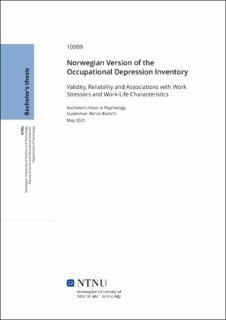| dc.contributor.advisor | Renzo Bianchi | |
| dc.contributor.author | Otnes, Thea Marie | |
| dc.date.accessioned | 2023-07-14T17:20:07Z | |
| dc.date.available | 2023-07-14T17:20:07Z | |
| dc.date.issued | 2023 | |
| dc.identifier | no.ntnu:inspera:146342237:68091526 | |
| dc.identifier.uri | https://hdl.handle.net/11250/3079054 | |
| dc.description.abstract | Det nylig utviklede instrumentet, Occupational Depression Inventory (ODI), måler depressive symptomer som individer spesifikt tilskriver jobb. Instrumentet kan være et nyttig verktøy i arbeidet med å forebygge og behandle psykisk sykdom relatert til jobb. ODI inneholder ni symptomelementer med referanse til diagnosekriterier for alvorlig depressjon i DSM-5 . Denne studien hadde som mål å validere en norsk versjon av ODI.
Data ble samlet inn fra et norsk utvalg på 485 voksne i arbeidsstyrken. Strukturelle og psykometriske egenskaper ved den norske versjonen av ODI ble undersøkt, basert på faktoranalyse, reliabilitetsanalyse og korrelasjonsanalyse. ODI viste sterk faktoriell validitet og reliabilitet, og viste en grad av konvergent validitet og en grad av diskriminerende validitet mot Hospital Anxiety and Depression Subscale, HADS-D. Resultatene underbygger videre kriterievaliditeten til ODI. Det ble funnet signifikante korrelasjoner med arbeidsstressorer, som inkluderer utstøting, verbale overgrep og fysisk aggresjon, samt sosioøkonomisk optimisme, sykemelding, kjønn og alder. Det ble ikke funnet noen signifikant korrrelasjon med jobb-forfremmelse. | |
| dc.description.abstract | The Occupational Depression Inventory (ODI) aims to measure depressive symptoms that individuals specifically attribute to their work. As such, the instrument may provide a useful tool in efforts of preventing and treating job-related distress. The instruments contains of nine symptom items with reference to DSM-5 diagnostic criteria of major depressive disorder. This study aimed to validate a Norwegian version of the ODI.
Data was collected from a Norwegian sample of 485 adults in the workforce. Structural and psychometric properties of the Norwegian version of the ODI were examined, based on common-practice factor analysis, reliability analysis and correlation analysis. The ODI exhibited strong factorial validity and reliability and exhibited a degree of convergent validity and a degree of discriminant validity against the Hospital Anxiety and Depression Subscale, HADS-D. Results further substantiate the concurrent criterion validity of the ODI, through significant correlations with the work stressors of ostracism, verbal abuse and physical aggression, as well as socioeconomic optimism, sick leave, sex and age. No significant correlation was found with job promotion. | |
| dc.language | eng | |
| dc.publisher | NTNU | |
| dc.title | Norwegian Version of the Occupational Depression Inventory: Validity, Reliability and Associations with Work Stressors and Work-Life Characteristics | |
| dc.type | Bachelor thesis | |
